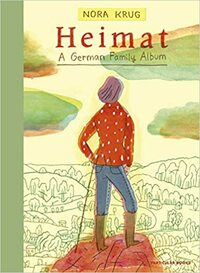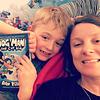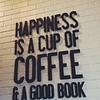Take a photo of a barcode or cover
challenging
dark
emotional
informative
reflective
sad
tense
medium-paced
Moderate: Genocide, Antisemitism
Minor: Racism, Religious bigotry, War
challenging
informative
reflective
medium-paced
Hast du je ein Buch gelesen, das sich beim Durchblättern anfühlte wie ein richtig guter Museumsbesuch? Also wie der Besuch in einem Museum, bei dem du immer wieder innehältst, staunst, deine Begleitung begeistert auf Dinge hinweist, die so spannend sind, dass sie die auf keinen Fall verpassen darf?
So ging es mir beim Lesen von 'Heimat. Ein deutsches Familienalbum', einer Graphic Novel von Nora Krug. Die US-amerikanische Illustratorin mit deutschen Wurzeln schreibt darin von ihrer Familiengeschichte, ihrer Spurensuche in der Vergangenheit. Was sie herausfinden möchte: Was hat ihre eigene Familie eigentlich mit der deutschen Geschichte zu tun, mit dem Nationalsozialismus und dem Holocaust? Die Graphic Novel beinhaltet ein Sammelsurium an kuriosen Fakten, an Fragen zur eigenen Identität im Angesicht der grausamen Geschichte, an Fotoalben und Familienmitgliedern, die sich an nichts erinnern wollen. All diese Informationen zeichnen ein Stimmungsbild davon, was es eigentlich bedeutet, Deutsch zu sein – nicht nur für die Autorin, sondern für eine ganze Generation an Enkel*innen und Urenkel*innen, die auf eine Weise auch die Geschichte, die Bürde ihrer Großeltern, ihrer Heimat in sich tragen.
Die Tage ist eine weitere Graphic Novel von Nora Krug erschienen, in der sie sich mit dem Krieg in der Ukraine auseinandersetzt. Nachdem mich 'Heimat' absolut begeistert hat, kann ich es kaum erwarten, auch dieses zu lesen.
So ging es mir beim Lesen von 'Heimat. Ein deutsches Familienalbum', einer Graphic Novel von Nora Krug. Die US-amerikanische Illustratorin mit deutschen Wurzeln schreibt darin von ihrer Familiengeschichte, ihrer Spurensuche in der Vergangenheit. Was sie herausfinden möchte: Was hat ihre eigene Familie eigentlich mit der deutschen Geschichte zu tun, mit dem Nationalsozialismus und dem Holocaust? Die Graphic Novel beinhaltet ein Sammelsurium an kuriosen Fakten, an Fragen zur eigenen Identität im Angesicht der grausamen Geschichte, an Fotoalben und Familienmitgliedern, die sich an nichts erinnern wollen. All diese Informationen zeichnen ein Stimmungsbild davon, was es eigentlich bedeutet, Deutsch zu sein – nicht nur für die Autorin, sondern für eine ganze Generation an Enkel*innen und Urenkel*innen, die auf eine Weise auch die Geschichte, die Bürde ihrer Großeltern, ihrer Heimat in sich tragen.
Die Tage ist eine weitere Graphic Novel von Nora Krug erschienen, in der sie sich mit dem Krieg in der Ukraine auseinandersetzt. Nachdem mich 'Heimat' absolut begeistert hat, kann ich es kaum erwarten, auch dieses zu lesen.
informative
reflective
medium-paced
challenging
emotional
hopeful
inspiring
reflective
fast-paced
challenging
dark
emotional
hopeful
informative
inspiring
mysterious
reflective
sad
tense
fast-paced
challenging
informative
inspiring
reflective
medium-paced
This is the best graphic memoir I’ve read in a long time, and I read a lot of them. I love Kraig’s use of primary source documents and her art is perfection. I love her deep research and interviewing. A German woman reconciling with her family’s hidden past. Highly recommended
The author attempts to come to terms with her family’s history and that of her country. This is a beautiful book physically: the drawings and scrapbook feel to it are engrossing and fascinating. We see scraps of Nora’s school books. We see her Uncle’s as well, decorated with flowers but also swastikas. She goes in search of her family’s involvement in the Second World War, trying to exorcise the ghosts of war. I loved every page of this book.
... Heimat can only be found in memory, that it is only something that begins to exist once you've lost it.
Back in October of 2018, I picked up this graphic memoir at an outdoor used book sale. I thought it was a fortuitous find for two reasons. One: this period of reckoning, known as vergangenheitsbewältigung (struggling to overcome the [Nazi] past) was a topic that my German cultural history class was covering and I wanted to read this book as supplemental reading material. Two: I also got this book for dirt cheap (I paid $5 vs the list price of $30) considering this book was released one week before I purchased my copy. I have no idea how it ended up at the used book sale I stumbled upon because it was in immaculate condition. Anyway, despite my intentions to read it back in October of 2018, I ended up finally picking it up in March of 2022. We've all been there, am I right?
This is an absolutely fascinating work. Krug draws on family sources like letters and photographs, to archival material and flea market finds to explore the concept of Heimat. To translate Heimat as homeland masks the complicated meaning and history of the word. Heimat is a concept that Germans have struggled to put precisely into words and it ties in with German cultural identity and their sense of belonging. Krug explores this challenge for a German to define Heimat and the struggle to reckon with a horrible past on a national and personal scale through the combination of her art and photographs. It blurs the line between the individual and the national, the personal and the communal.
I highly recommend this book, especially to those interested in German cultural history.
Back in October of 2018, I picked up this graphic memoir at an outdoor used book sale. I thought it was a fortuitous find for two reasons. One: this period of reckoning, known as vergangenheitsbewältigung (struggling to overcome the [Nazi] past) was a topic that my German cultural history class was covering and I wanted to read this book as supplemental reading material. Two: I also got this book for dirt cheap (I paid $5 vs the list price of $30) considering this book was released one week before I purchased my copy. I have no idea how it ended up at the used book sale I stumbled upon because it was in immaculate condition. Anyway, despite my intentions to read it back in October of 2018, I ended up finally picking it up in March of 2022. We've all been there, am I right?
This is an absolutely fascinating work. Krug draws on family sources like letters and photographs, to archival material and flea market finds to explore the concept of Heimat. To translate Heimat as homeland masks the complicated meaning and history of the word. Heimat is a concept that Germans have struggled to put precisely into words and it ties in with German cultural identity and their sense of belonging. Krug explores this challenge for a German to define Heimat and the struggle to reckon with a horrible past on a national and personal scale through the combination of her art and photographs. It blurs the line between the individual and the national, the personal and the communal.
I highly recommend this book, especially to those interested in German cultural history.
challenging
dark
reflective
sad
tense
I was interested in this on a personal level, as my grandfather is a displaced person from the former eastern German territories and my grandmother’s father was a small town German businessman in the west. I have had similar thoughts and questions of my own family history.
Overall, the tone was very melodramatic and was more about finding answers than an in-depth reflection of why her, family members would act as they did. It read like, “Nazis were bad, PLEASE don’t allow that my family members would have been bad people.” This led to a lack of nuance in the writing and the snow metaphor was particularly unsubtle.
The mixed media presentation was engaging; the use of official forms was paradoxically emotional in their starkness. It was annoying how Krug would place a picture in the middle of a sentence so your eyes had to jump across the image.
We (hopefully) all know that Nazis were and are bad. The interest lies in why people, who see themselves as good, get involved in extreme ideas. For this reason the first half of the book was more interesting where Krug was asking questions and exploring the enduring German shame.
Overall, the tone was very melodramatic and was more about finding answers than an in-depth reflection of why her, family members would act as they did. It read like, “Nazis were bad, PLEASE don’t allow that my family members would have been bad people.” This led to a lack of nuance in the writing and the snow metaphor was particularly unsubtle.
The mixed media presentation was engaging; the use of official forms was paradoxically emotional in their starkness. It was annoying how Krug would place a picture in the middle of a sentence so your eyes had to jump across the image.
We (hopefully) all know that Nazis were and are bad. The interest lies in why people, who see themselves as good, get involved in extreme ideas. For this reason the first half of the book was more interesting where Krug was asking questions and exploring the enduring German shame.





